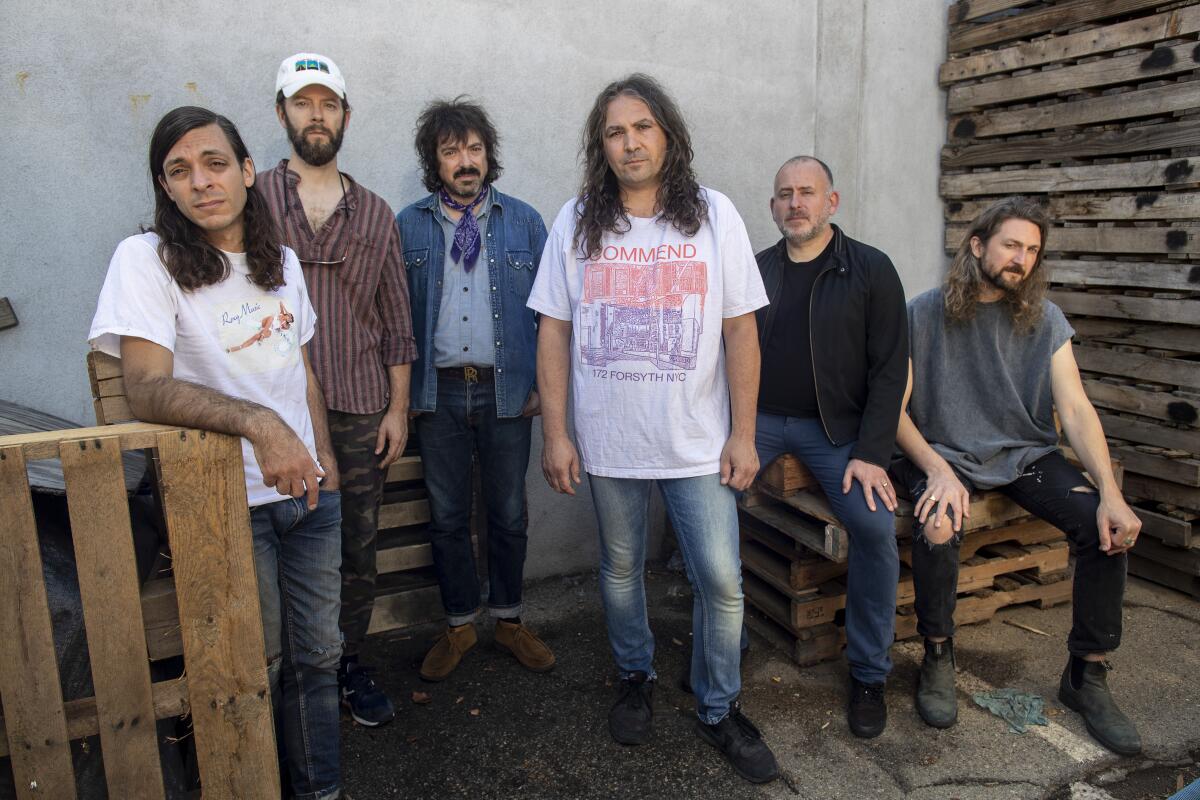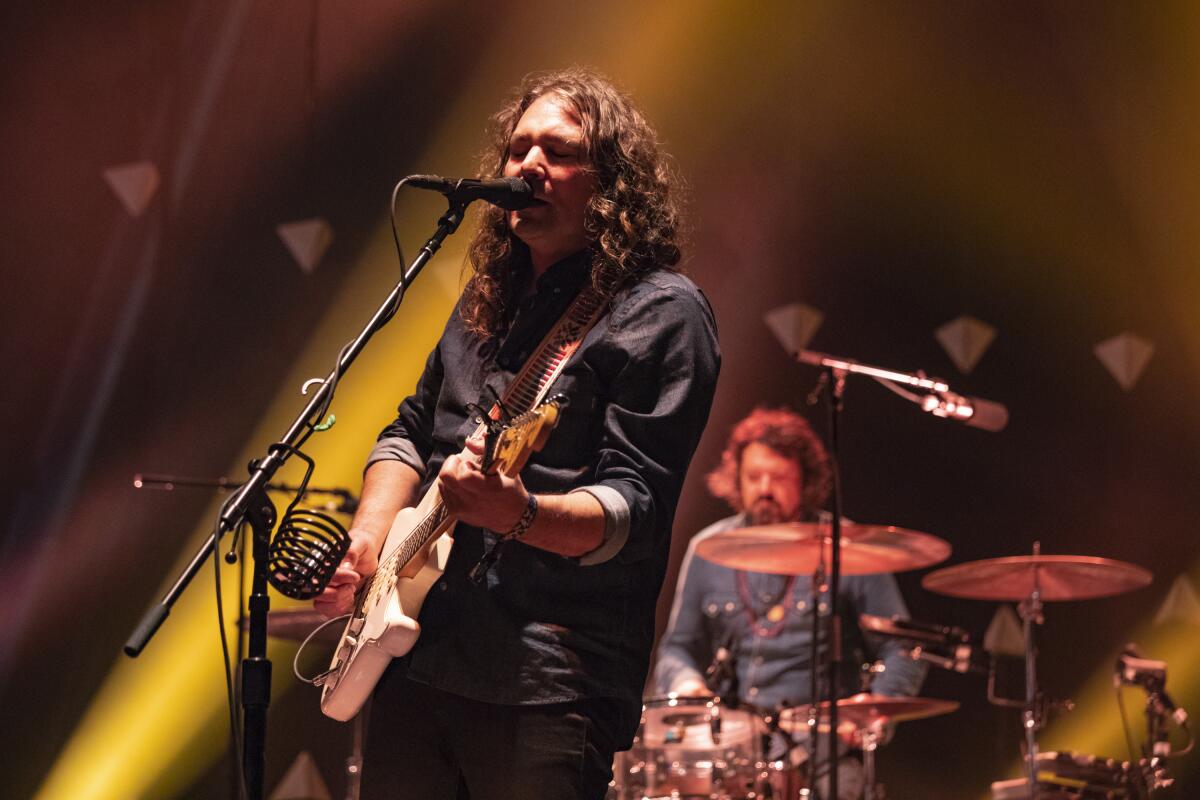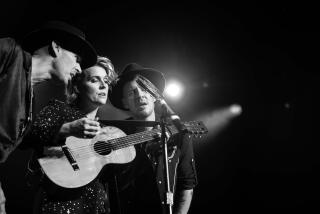For the War on Drugsâ new L.A. album, fewer guitar solos, more golf

For years, Adam Granduciel resisted moving to Los Angeles because he didnât want to be seen as the villain in a Bruce Springsteen song.
âYou know that part in âRacing in the Streetâ where heâs talking about blowing the dude from L.A. off the track?â asks the frontman and creative mastermind of the War on Drugs, referring to Springsteenâs drag-racing epic from âDarkness on the Edge of Town.â âThereâs this live version I love where he does that line and everyone in Giants Stadium cheers â like, âYeah, fâ that guy!ââ
A proud East Coast native whose band came up in Philadelphiaâs scrappy, close-knit indie-rock scene, Granduciel, 42, feared that going west would signal a careerist rearrangement of his priorities â âa detachment from something that I wasnât ready to appear detached from,â as he puts it.
Yet family beckoned: In 2019, his son with actress Krysten Ritter was born, so after a long stretch of shuttling between Philly and L.A. â not to mention a Grammy win that had already said plenty about his upward career trajectory â Granduciel settled down in the Valley, not far from a driving range where heâd end up spending a fair amount of outdoor time once the COVID-19 pandemic hit. (The kidâs name, in case his fatherâs allegiance to the Boss wasnât clear, is Bruce.)
Now, the War on Drugs is releasing a lustrous new album, âI Donât Live Here Anymore,â that despite Granducielâs anxieties reflects something of his adopted home. The follow-up to 2017âs âA Deeper Understanding,â which earned rave reviews and beat LPs by Metallica and Queens of the Stone Age for the rock album Grammy, âI Donât Live Here Anymoreâ still draws from the eternal dad-rock wellspring â think Springsteen, Bob Dylan, Neil Young, Tom Petty â that inspired Granduciel to form the band in 2005.

But where the War on Drugsâ earlier records stretched those influences to trippy psychedelic extremes, this one is catchier and more compact, with a glossy â80s-throwback production job and an emphasis on Granducielâs parched singing that evoke the days when grown-up white guys could wear stylish trench coats and star in moody black-and-white videos on MTV.
âI think the first thing anybody would notice about the album is that itâs got a lot fewer lengthy guitar solos,â says Steve Ralbovsky, the veteran A&R executive who signed the War on Drugs to Atlantic Records (and before that identified the Strokes and Kings of Leon as scruffy rock acts with potential crossover appeal).
The band even has one of those old-school videos for the LPâs shimmering title track, in which Granduciel strolls squinty-eyed down the beach before donning a pair of shades to jam with his bandmates on a windy rooftop with the L.A. skyline behind them.
ââThe End of the Innocenceâ,â he says of Don Henleyâs perfectly airbrushed ballad, âis definitely my sâ.â

You wouldnât say the music threatens to turn the happily rumpled Granduciel from a cult fave into a pop idol. After years in which rock kept receding further from the mainstream, though, the vintage sounds that have long fascinated him have become newly fashionable among certain high-profile types: Last year, the Killers asked Granduciel to appear on their âImploding the Mirageâ album; this year, John Mayer took up a Clapton-discovers-the-synthesizer vibe for his obsessively detailed âSob Rock.â (âJohn Mayerâs New Song Sounds Like the War on Drugs,â reads the headline on a Stereogum post.)
Sipping a Diet Coke as he reclines in a beat-up leather chair at his rehearsal space in Burbank, Granduciel gently rejects the comparison. âHis stuff is so clear and deliberate, which is totally sweet,â he says of Mayer, whose album heâs heard âa couple songsâ from. Granduciel, dressed in a T-shirt, basketball shorts and a 76ers cap, is a little sweaty from having rushed over from home after trying, and failing, to put Bruce down for a nap. âBut I wouldnât know how to make a record that dialed-in.â
With its intricate grooves and beautifully rendered textures, âI Donât Live Here Anymoreâ â which Granduciel co-produced with Shawn Everett, whoâs also worked with Kacey Musgraves and Haim â suggests otherwise. So does this space filled with dozens of guitars, keyboards, amps and pedals, any one of which Granduciel can identify with a litany of stats. He just signed the lease for the place in March, but it âalready looks like the inside of Adamâs head,â says the War on Drugsâ bassist, Dave Hartley. (The bandâs other members, who live scattered around the country, are guitarist Anthony LaMarca, drummer Charlie Hall, keyboardist Robbie Bennett and saxophonist Jon Natchez.)
Last year, the Rolling Stones hired Granduciel to remix âScarlet,â an unreleased 1974 cut featuring Jimmy Page on guitar and â as Granduciel was told â Creamâs Ginger Baker on drums. Turns out that Baker wasnât on the track, as Mick Jagger later clarified over the phone, which made Granduciel feel better, given that heâd replaced the drums with his own. âI had a laugh with Mick about that,â he says. âBlew my mind.â
The War on Drugs tracked much of the new album before the pandemic in storied L.A. studios including Electro-Vox, EastWest and Sound City. âStudio B at Sound City,â Granduciel specifies with characteristic precision. Yet during pandemic-related closures, the frontman â widely understood since the bandâs beginning as a kind of benevolent dictator â started soliciting contributions remotely from his bandmates; he often loved what they laid down without having him looking over their shoulders.
âI think heâs realized that his creative powers arenât diminished by letting people see his process a little bit,â Hartley says.

Granduciel recruited outsiders too, including players from L.A.âs Dawes and Lucius, the female vocal duo thatâs performed with actual classic rockers such as Roger Waters and Jackson Browne. âAdam came to see us on tour a couple of times with Roger,â says the duoâs Jess Wolfe, âand I think he was moved by what it was we brought to this very masculine scene.â Indeed, Luciusâ soulful vocals give the music a welcome tenderness that cuts against what mightâve been coldly technical.
As steeped as the frontman is in the traditions of guitar music â âOld Skin,â per the albumâs liner notes, features Granduciel on âWalter Beckerâs old bassâ â his curatorial approach isnât entirely different from a hip-hop producerâs; heâs building a world of sound from many different parts, and he sometimes uses near-quotes from old songs like dusty samples: the synth lick from Tears for Fearsâ âHead Over Heels,â for instance, in the new albumâs title track, or the drum-machine beat from Phil Collinsâ âIn the Air Tonightâ in the heavy-breathing âI Donât Wanna Wait.â
âThe CR-78,â he says of the primitive Roland device featured in Collinsâ song. âI used the same machine â well, actually, itâs just in an app on my phone.â He grins and pulls it out of his pocket. âItâs called FunkBox.â
Lyrically, âI Donât Live Here Anymoreâ feels shaped by Granducielâs becoming a parent; the album carries vivid if vaguely phrased thoughts regarding time, connection and memory. Yet he points out that he wrote many of the songs before Bruce was born, including the strummy opening track, âLiving Proof,â which is âall about the promises you tell yourself about how youâre going to move into this next phase of your life a different, more grounded person.
âSometimes Iâll listen to it and pretend I wrote it about having a kid,â he adds with a laugh.

Granducielâs own childhood was comfortable. He grew up with two siblings near Boston, where his dad owned a discount womenâs clothing store â âEllen Tracy jeans with a missing belt loop, that kind of stuffâ â and his mom worked as an aide at a Montessori school. He studied art history at college in Pennsylvania, then later worked a series of unsatisfying jobs in Philadelphia before befriending Kurt Vile, a fellow Springsteen-loving singer-guitarist; Granduciel played in Vileâs band, the Violators, and Vile played in the War on Drugs before they amicably went their separate ways.
When the War on Drugs started taking off around 2011âs âSlave Ambientâ album, Granducielâs dad told him he should include hats in the bandâs merch. âHe was like, âYou buy âem for 2 and sell âem for 6,ââ Granduciel remembers. Nobody bought them, but the singer was so touched by the interest his father had taken in his work that he kept all the hats. âTheyâre in a Tupperware somewhere,â he says.
Granduciel, whoâs generally warm and chatty in conversation, prefers not to talk publicly about his relationship with Ritter. After our conversation, tabloid reports emerged saying the couple had split, though Granduciel denied that to the New York Times.
Heâs more forthcoming about how family life might affect his career in the future. Pre-pandemic, the War on Drugs had established a reputation as a knockout live act; itâs slowly venturing back on the road with a headlining gig at next monthâs Desert Daze festival in Riverside County ahead of a tour in early 2022 that will stop at New Yorkâs Madison Square Garden.
Yet being at home for the first two years of his sonâs life has changed Granducielâs thinking about being gone for weeks at a time. âWeâre the first generation in a long time â as are they â to spend so much time with our kids,â he says. âI asked my dad how much time he took off after I was born, and he was like, âForty-five minutes? I went to work the next day.ââ
Beyond finishing his album and âhanging with Bruce,â as he puts it, golf was Granducielâs chosen pandemic pastime; he even sings about âliving down by an old par 3â in the LPâs Dylan-esque closer, âOccasional Rain.â Asked if heâs started rooting for L.A.âs pro sports teams since he put down roots in the city he once avoided, he replies that the Lakers were never an option for a childhood Celtics fan.
âBut my favorite moment in sports history, even having been to some classic Larry Bird games when I was a kid, is Kirk Gibsonâs home run with the bum leg,â he says, referring to the former Dodgerâs famous walk-off in the 1988 World Series. âI still get goose bumps when I see it. So I could probably justify wearing a Dodgers hat.â
More to Read
The biggest entertainment stories
Get our big stories about Hollywood, film, television, music, arts, culture and more right in your inbox as soon as they publish.
You may occasionally receive promotional content from the Los Angeles Times.











